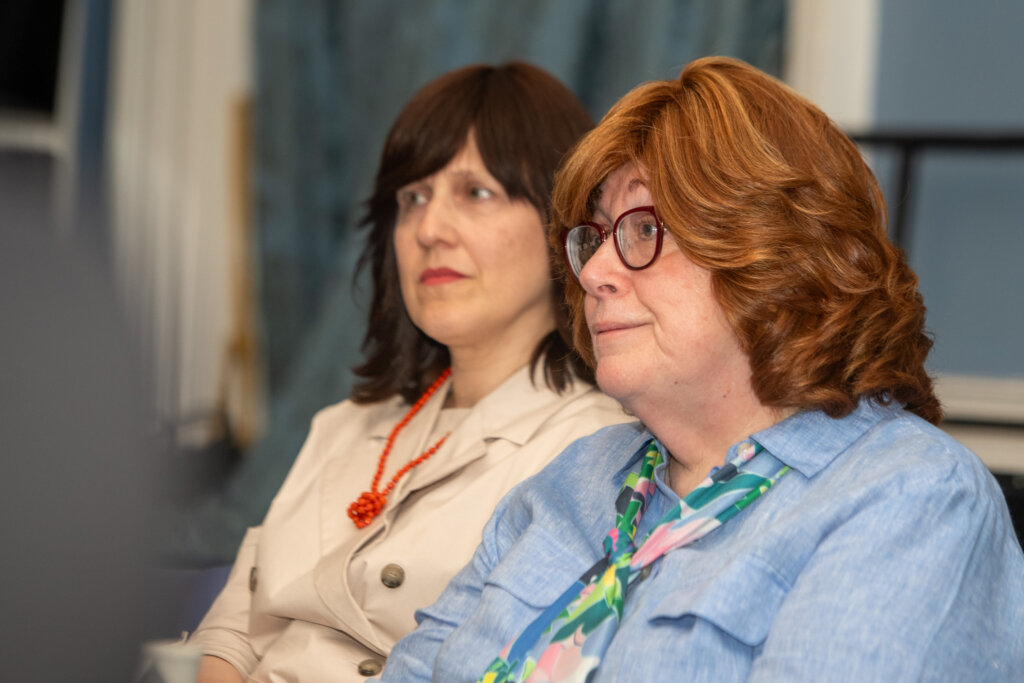NYC mayor’s office rebuts critique that his Jewish advisory council overrepresents the Orthodox and men
Eric Adams called on Jewish New Yorkers ‘who believe they could make impactful change’ to apply to join

New York City Mayor Eric Adams at the inaugural meeting of his Jewish Advisory Council on June 26, 2023. Photo by Benny Polatseck/Mayoral Photography Office
A spokesperson for New York City Mayor Eric Adams attacked The New York Times on Thursday, accusing it of fueling “animosity” toward Jews after it published an article highlighting claims that the mayor’s newly formed Jewish Advisory Council lacks diversity.
“It is no secret that anti-Semitism is increasing worldwide, and hatred takes on various forms,” said Kayla Mamelak, a City Hall spokeswoman. “Those who fuel this animosity only aim to divide us.”
And in a statement shared with the Forward, members of the advisory council encouraged people who believe they can be of influence to apply to join the panel.
Adams launched the panel last month to “ensure that Jewish New Yorkers in every community have a seat at the table.” It includes 37 members, rabbis and leaders who, the mayor’s office touted, together represent the spectrum of the city’s Jewish community. It will convene regularly to discuss public safety, education and quality of life issues among other topics.
But critics said that it is hardly representative of Jewish New Yorkers, a generally left-leaning group, because at least 23 members are Orthodox Jews and only nine are women.
The Times article described the “archetypical” Jewish New Yorker as someone “found on the Upper West Side, somewhere between Zabar’s and Barney Greengrass” in apparent contrast to Orthodox leaders more likely to make their homes in Brooklyn. It featured criticism from Rep. Jerry Nadler of New York, the dean of the informal congressional Jewish Caucus and Ruth Messinger, the former borough president of Manhattan.

Separately, Rabbi Rachel Timoner of Congregation Beth Elohim and Rabbi Sharon Kleinbaum of Beit Simchat Torah, co-founders of the progressive New York Jewish Agenda group, protested the makeup of the council in a letter to the mayor. The group last year met with Adams, who has forged strong ties with the city’s conservative Orthodox Jewish community, to convey the message that most Jews in the city identify as Democrats and hold liberal political views.
Mamelak said that the thrust of the Times’ story, that Adams didn’t choose enough of a certain type of New York Jew, is “blatantly false and deeply disturbing.”
She said the council is an inclusive group “hailing from various religious and cultural backgrounds, including Chabad, Conservative, Hasidic, Non-Denominational, Modern Orthodox, Reform, Sephardic, and Yeshiva Orthodox affiliations.”
“Lumping these groups together to insinuate that there is either ‘too much’ or ‘not enough’ is a dog whistle that unfortunately resonates with the Jewish people all too well and disrespects the uniqueness and cultural originality of these institutions,” Mamelak said.
City Hall officials, who requested anonymity to discuss internal conversations, said that Rabbi Angela Warnick Buchdahl, senior rabbi of Central Synagogue in New York City, a progressive congregation affiliated with the Reform movement – whose name was mentioned in the letter ot the mayor – turned down an invitation to join the group because she didn’t have enough time.
They also pointed non-Orthodox members of the council, including Rabbi Joanna Samuels, chief executive of the Marlene Meyerson JCC Manhattan, and Rabbi Rachel Ain of the Sutton Place Synagogue, a Conservative congregation in Midtown Manhattan.
The Jewish Advisory Council in its statement said they take pride in serving on an inclusive panel with a “dynamic blend of expertise in various sectors,” and encouraged “all of those who believe they could make impactful change” to apply to join.
This call was echoed by Adams when he was first told about the criticism, according to a City Hall official. “Hailing from all five boroughs, we collectively bring a wealth of experience and knowledge to the Adams administration regarding the issues that affect New York City’s Jewish community and our city as a whole,” they said in their statement.
Mamelak said the Times chose to omit from its article Adam’s invitation for others to join the council.
Update, July 10, 2023:
In a statement on Monday, the New York Jewish Agenda said that it welcomes the mayor’s willingness to broaden the panel of advisers — with conditions.
“We encourage City Hall to establish, announce publicly, and conduct an open, transparent application process that encourages a wide range of Jewish leaders to apply,” the group said. “The application process should outline the goals and purpose of the Council, inviting Jewish leaders of diverse perspectives to put forward their experience and aspirations. Only with such a process can a diverse and representative group of leaders truly be considered and assembled.”
Additionally, Brad Lander, the city’s comptroller, and Manhattan Borough President Mark Levine, along with a group of Jewish state lawmakers, sent a letter to Mayor Adams imploring him to “take a second look” and expand the membership “to better represent the reality of Jewish demographics in the city.”
Also today: @NYCComptroller, @MarkLevineNYC and a group of Jewish state lawmakers sent a letter to Mayor Adams imploring him to "take a second look" and expand the membership of the Jewish Advisory Council "to better represent the reality of Jewish demographics in the city." https://t.co/xOe4e73OMQ pic.twitter.com/gSkUnQbnnQ
— Jacob N. Kornbluh (@jacobkornbluh) July 10, 2023
Adams said in a statement that the council “was designed to be and will always be inclusionary” and that his administration has already reached out to other elected leaders to ask for their help with outreach to add more members. The mayor mentioned more moderate lawmakers — Eric Dinowitz, chair of the NYC Jewish Caucus; Councilwomen Julie Menin of Manhattan, Lynn Schulman of Queens and Inna Vernikov, a Republican from Brooklyn; Councilman Kalman Yeger, a conservative Democrat who represents the Orthodox community in Brooklyn; Assemblymember David Weprin and Daniel Rosenthal of Queens — who “are actively working with us to ensure the composition of this committee ensures every voice is heard by City Hall.”






















